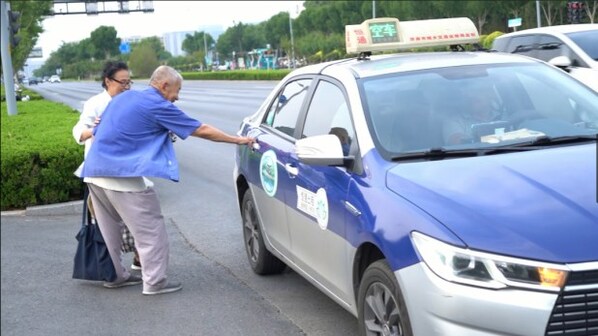HONG KONG, Jan. 10, 2025 /PRNewswire/ --
The 'Digital Travel Dilemma' of the Elderly
The internet is evolving at an unprecedented pace, significantly enhancing convenience for young people, while the elderly are increasingly find themselves unfamiliar with smartphones. Services like e-map navigation and online ride-hailing, which seem commonplace, have become a digital divide that restricts the travel of the elderly. They face a competitive disadvantage in hailing rides and often struggle to find a taxi on the roadside for extended periods. According to a recent survey, only 24.1% of elderly individuals in China are able to use smartphones to assist with their daily lives, 74% of the elderly still hail taxis on the roadside, and 25% of the elderly travel less than one kilometer in their daily outings.
To address the digital travel barriers for the elderly, several initiatives have been implemented. The Ministry of Transportation of China has launched the 95128 ride-hailing service hotline. However, challenges remain regarding user location accuracy and the high costs and low efficiency of human customer service, making both usage and promotion of the service very challenging.
A New Way of Locating
Without Internet traffic, GPS, e-maps or smartphones, can precise positioning be achieved by voice only? In order to solve this problem, China Telecom have developed "Voice-Only Location and Navigation Tech". Based on the Open Gateway APIs of GSMA and the LLM 'TeleChat' developed by China Telecom, the world's first voice-only positioning and navigation large model 'TeleNavi' is trained, which effectively filling a critical gap in the market. Through secondary training of the large model, a series of specific downstream tasks, including User Intent Recognition, Location Keywords Extraction and Address Verification have been effectively addressed. The positioning accuracy can reach within 5 meters, with an average time consumption of 25 seconds.
In alignment with the commitment of "people-oriented, AI for good", China Telecom applies this technology to provide accurate and timely car-hailing service and real-time companion navigation for the elderly.
Commercial Implementation
Currently, pilot commercial operations is carried out in Rizhao City of Shandong Province and Shangzhi City of Heilongjiang Province, with an average daily use of 80-10,000 orders in a single third-tier city and an estimated annual revenue of 7 million CNY, significantly reducing human customer service costs and significantly improving the efficiency of car-hailing operations and the satisfaction of both drivers and passengers, which has received commendations from the government transportation departments, taxi companies, drivers, and passengers. So far it has served about 600,000 users, and driven 7 million CNY of accumulated revenue from value-added services such as Special Lines, IOT Cards, SMS, Voice DICT and so on.
Future Prospects
As articulated in the company's corporate mission: "Let customers fully enjoy the new life of information," this project represents a significant effort by China Telecom to innovatively serve users through Open Gateway API capabilities and AI, having won the runner-up position in the MWC24 GSMA Open Gateway Hackathon and invited to the 2024 World Internet Conference. These accolades reflect the company's dedication to social responsibility, value creation and promotion of digital innovation within age-friendly service and silver economy.
TeleNavi helps the elderly overcome the travel dilemmas of the digital age, share the benefits of technological development, and enables those who are increasingly left behind by the smart era to truly perceive and use AI, bridging the digital divide and staying connected with the intelligent era.
It also provides a new approach to complement existing positioning methods, which has broad application prospects and important value in the fields of aging navigation and emergency search and rescue.
source: China Telecom Global
【香港好去處】etnet全新頻道盛大推出!全港最齊盛事活動資訊盡在掌握!► 即睇
























